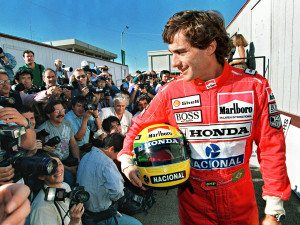Why a third world title would not make Lewis Hamilton a legend – yet
In Formula One, as in any sport, there are ‘greats’ and there are ‘legends’. Winning the world championship is enough to see a driver join the greats of the sport. Those that win multiple titles often have the title of legend bestowed on them by fans and pundits alike.
Lewis Hamilton is fourth on the all-time list of race wins, while only Michael Schumacher and Ayrton Senna accumulated more pole positions in their respective careers. Hamilton is also odds-on to win his third world championship this season. Yet even if he wins another championship the F1 fans of today will not rush to grant the British driver legendary status – but the fans of tomorrow will.
While Hamilton is still racing he will simply not be able to compete with Senna.
In all sports the greats of the past are remembered in an almost mythical way, where their strengths are accentuated and their weaknesses diminished. While Hamilton is still racing he will simply not be able to compete with that. Take Senna as an example. He is widely regarded as the greatest driver ever to grace the track, owing to his incomparable single-lap pace, his ruthless will to win and his skill in negotiating wet-weather conditions. Yet what is forgotten is that the ruthlessness born out of his determination to finish first sometimes put other racers in danger.
Hamilton’s recent victory in the Japanese Grand Prix was his 41st in F1, putting him level with Senna. He will easily surpass the Brazilian’s number of race victories and if he wins the world title this season the two drivers will be tied on three world championships. But until he hangs up his racing gloves he will be seen as inferior to his idol.
Why? Because the incidents that left the British driver attracting headlines for the wrong reasons are still fresh in the memory. This has been the case ever since the early days of F1 and it is why very few legends of the sport have received due recognition while they are still racing. Until the day that we can look back on Hamilton’s career he will not enjoy the legendary status that he surely deserves.
This mythical aura is not limited to individuals. Today’s F1 fans look back to the sepia-tinted images of forty, fifty and sixty years ago and inevitably compare it to modern racing. Every sport compares the present to the past, but F1 has the added complication of being part man-part machine. The fact that the cars of previous eras were faster, louder and more dangerous means that fans are more prepared to thrust legendary status onto the greats of these eras’.
Yet he will only be crowned as a legend of his sport when he has retired from top-level racing.
This is not to say that these drivers do not deserve to be called legends. Many of them were skilful enough to excel in any car, in any era. Yet there is undoubtedly a romanticised view of F1’s past that attaches itself to the men behind the wheel. The increased risk adds an extra-edge to the achievements of the drivers from the 50’s and 60’s, especially to today’s fans. This amplifies their greatness, to the disadvantage of modern legends such as Hamilton.
There is no doubt that one day Hamilton will complete the transition from great to legend. He has already statistically bettered almost every legend of the past and is young enough for his career to last for at least another five years. He has shown the consistency to win races in all of his nine seasons in F1. He has displayed the ruthlessness, determination and raw speed possessed only by those at the very top.
Yet he will only be crowned as a legend of his sport when he has retired from top-level racing. A third world title for Lewis Hamilton will not make him a Formula One legend overnight, but it will ensure he is granted that status in years to come.



Comments